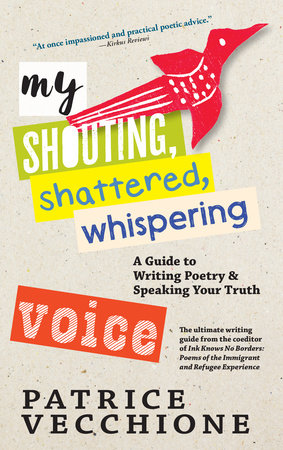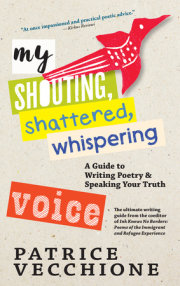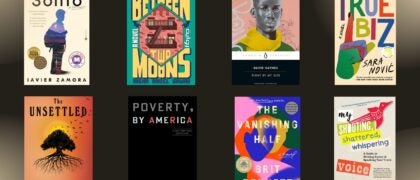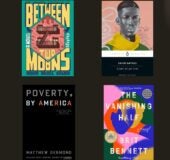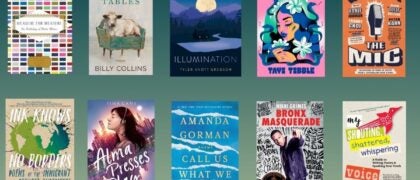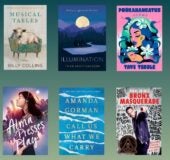Introduction
A Chewed-Up Pencil in the Back Pocket of an Old Pair of JeansOnce upon a time a girl lost her voice. She had been treated cruelly, and for years, she said not a yes or a no. What she couldn’t say out loud—the unspeakable and the everyday things—she turned into poems, and that led her later to reclaim her voice, anew, aloud.
Once upon another time a boy kept a journal that he filled with his life’s challenges and triumphs. When his father found the notebook he read it, and in front of the boy, he set a match to his son’s words. That would have kept many from writing again. This young man bought a new notebook, wrote a new poem, and after memorizing it, tore out the page and set a match to it himself. At the top of the next page he wrote the first word of his new poem. If his father were to read it, there would be nothing to anger him. This notebook with the mostly missing words later became the young poet’s first book. Such was the determination of the poet within him.
Our lives are made of stories and poems, from the tiniest incidents to the biggest—early childhood experiences like icing your first cake to more recent ones like a first crush. There’s hitting your first home run, the private embarrassment of cheating on a test and not getting caught, a #MeToo moment.
Writing poems is a way to uncover what most needs to be uncovered—to loosen the tongue in solitude, to make connections that can’t be made in conversation. Poems are made of questions more than answers. They can withstand sudden shifts of direction, may be full of contradictions. Poems don’t shy away from incomplete sentences. A poem of no more than three lines can defy darkness or change the wind’s direction. The poet Kwame Dawes said, “Poetry offers us the capacity to carry in us and express the contradictory impulses that make us human.”
Once upon another time there was a kid who was overwhelmed by her life. She needed a way to reckon with her confusions, those knotted and gooey ones that pressed against her. Her father’s daily shouting in Italian and English made his eyes spin, and when he called her an idiot, she wanted to disappear. She was embarrassed by the slurred speech of her mother’s drunken public outbursts. At school she felt out of place, as though the oddities of her home life were visible. In front of most others she was quiet. But inside her head loud bees were swarming.
One morning during her first year of high school, wearing the brown felt hat with the beaded sunburst on the front (the hat she wore even to bed), her long hair falling down the length of her back, she walked out of class, giving no reason. Behind the music building, late morning winter sun leaned warm against the wall and she sat down. Someone was playing drums inside a classroom. But the girl was listening to something else, something within her, and it was persistent.
Pulling out a small notebook and a chewed-up pencil from the back pocket of her jeans, the girl began to write. Unlike the dread and drudgery that came with classroom writing, this was nearly effortless. It was as if the poem were writing her. She read it once to herself. Satisfied, she returned to class.
That girl was me. For a long time, my poems stayed hidden in notebooks. I wrote to make something out of what scared me, to separate myself from the crazy instability of my home life and the sense of not fitting in xv at school. To say how it felt, I wrote to save my life. Not for a long time did I have an inkling that within me there were books to be written, that I could become a writer.
That was lifetimes ago, really. That books have my name on the spine continues to amaze and delight me. When the first copy of a new one arrives in the mail, I’m glad you can’t see me because I dance around the house, holding the book in my arms like a small partner. When I see a book of mine on a shelf in a bookstore, I touch the place where my name is printed.
In poems, paragraphs and chapters, I discover that I know more than I thought I did, that I’m braver and more daring than I believed I could be, that I’m not as different from others as I once believed, and maybe most importantly, that I’m not the idiot girl my father told me I was.
Whatever your life situation—whether you live in a city high-rise or a cabin in the woods, whether you have one parent at home or two or none, whether you know what you want to say or think you’ve got nothing worth saying—there are poems within you that only you can write. I know that as well as I know the truth of sunlight’s warmth against my face on a cold day.
That voice of yours, does it shout? Has it ever hit against a wall, shattering like glass? Or does it whisper, making no more sound than a dream does? Has your voice been yours for a thousand years or are you finding it tonight—your very own voice calling to you—so you can’t fall asleep and must write word upon word on the page of night?
What you’ll write nobody else will. Nobody else can. You’re the only one who knows what you know, who dreams what you dream, the only one who’ll turn a phrase just so, who’ll follow the word “soul” with “tricks.” If you don’t write your poems, they will never be written, and the stories of your life will go untold. If you don’t write your poems, they’ll not even have the substance of smoke. If you don’t write your poems, they’ll be lost, and with those lost poems go parts of you.
But if you do write your poems, you will find that you have more life, that it will be sturdier than it was before, and truer. The details of the world will catch your attention more than ever. Writing one poem leads to writing another. The weight that pressed against your chest is carried away by a flock of crows. With your words you can stand up for yourself and others, and more than ever the world needs the truths that poems provide.
Chances are this book’s in your hands because poetry has called your name. You’ve got poems under your tongue; they’re lurking in the crevices of your days. Don’t remain unwritten! Make your indelible stain. Tattoo yourself to the pages of your life.
My Shouting, Shattered, Whispering Voice is divided into five sections. The first, “Poetry’s Calling: Finding Yourself on Paper,” looks at why writers write and what writing can do for us. We’ll explore what gets us to the page and look at how to deepen our encounters xvii with writing. The second section, “‘If One Part Were Touched, the Whole Would Tremble’: Poetry from the Inside Out,” focuses on poetry’s nitty-gritty—line break, voice and style, punctuation, metaphor and simile. The book’s third section, “Who Said You Couldn’t Say That?: Twenty-Five Poetry-Writing Inspirations in Twenty-One Short Chapters,” will give you lots to write about. When you’re ready to think about giving readings and publishing your poems, turn to the fourth section, “‘How Possible Might the Impossible Be?’: Getting Your Poetry Out There.” The book’s last section “Where to Go from Here: Poetry Resources,” consists of a compendium of websites and a bibliography.
Copyright © 2020 by Patrice Vecchione. All rights reserved. No part of this excerpt may be reproduced or reprinted without permission in writing from the publisher.

